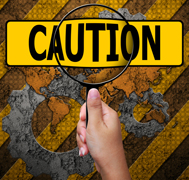 Preventing real estate fraud is a major challenge that most real estate sales professionals, and even lenders for that matter, encounter. Real estate fraud presents itself in many forms – some more common than others.
Preventing real estate fraud is a major challenge that most real estate sales professionals, and even lenders for that matter, encounter. Real estate fraud presents itself in many forms – some more common than others.
Title fraud: Though this doesn’t happen often, it is a costly form of fraud that one hopes they are protected against with their title insurance. As a real estate sales professional, do you want to be associated with the origination where title fraud is present on a deal? Absolutely not. The best ways to combat title fraud are to meet the borrowers, request identification, independently verify who is on title to the home and ask them questions about the home, sales history, even things in the area that may help you identify if something seems a bit off!
Value fraud: in a recent publication, the Law Society of BC had an excellent example of this type of fraud that we thought it would be prudent to share.
“Value fraud in this situation, back-to-back purchases of the same property are arranged from a legitimate vendor. The first purchase is for the arranged sale price — say $300,000. Then a subsequent (fraudulent) deal (from one fraudster to another) is arranged (i.e., a “flip”) for $400,000. Both purchases are set to close on the same day. The fraudster arranges for a high-ratio mortgage on the basis of the second deal. The high-ratio mortgage funds are used to close the real estate deals, since the amount of the mortgage (95% of $400,000 = $380,000) is enough to cover the deals. The fraudsters are counting on the financial institutions not doing their full due diligence or having an on-site appraisal done of the property to verify the stated property value. Sooner or later, the balance of the mortgage funds and the fraudster disappear, leaving the bank holding a mortgage for far more than the property is worth.”
“A second value fraud occurs when a legitimate agreement of purchase and sale is entered into between a vendor and the fraudster, say for $350,000. The vendor and the fraudster then sign a one-page amendment that provides a credit of $50,000 against the purchase price (stated to be for repairs). The fraudster does not disclose this credit in obtaining high-ratio financing. The deal closes and the mortgage payments stop shortly thereafter. The fraudster disappears with the balance of the financing leaving the bank with a mortgage greater than the value of the property.”
Check out the full article here: https://www.lawsociety.bc.ca/page.cfm?cid=1347&t=Practice-Tips:-Fighting-back-against-fraud-%E2%80%94-the-risks-in-real-estate.
Here are some red flags that can help you to suss out a real estate fraudster:
- A client is making a large property purchase with cash and cannot evidence this from the sale of another property.
- The client has documents to confirm the property transfer but not the original purchase and sale agreement.
- The property’s sales history is showing multiple recent purchases – each showing the value increasing.
- The client doesn’t want to provide identification, or will, but doesn’t want you to make a copy of it.
- The seller indicates that there was a deposit made that was not recorded on the purchase and sale agreement – with payment being made directly to the seller and not through you.
- The client wants the transaction closed very quickly.
- The client wants you to indicate a higher purchase price on the agreement than the actual purchase price.
- The sale price is unreasonably greater than that of other homes in the area.
- The title shows a history of mortgages being registered and then discharged in short time spans.
Above is just a short list of behaviours that can occur that can mean fraud. Your ears might be ringing but here come the words again: due diligence saves the day, most of the time. Think of water, forcefully flowing from the tap as your deals, now think of the spatter that escapes the stream as representing these instances when something on a deal is off. Maybe in these cases it is better to dig a little deeper and perhaps pass on a deal rather than getting caught in the middle of a fraud scheme that can not only get you in trouble, but also put your relationships with your partners at risk.
For more information about tools you can use to identify real estate fraud please visit www.geowarehouse.ca.







